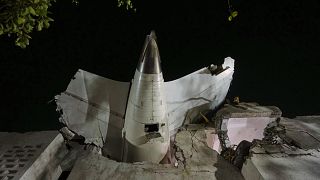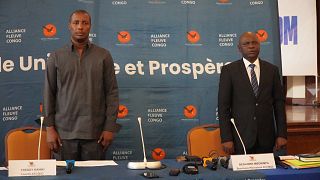Democratic Republic Of Congo
Twenty years on, Pétronille Vaweka remembers her heated exchanges with militiamen, the threats and the horrors in her home province of Ituri, in the north-east of the Democratic Republic of Congo, where her mission was to "stop the war".
Peace had returned, but the conflict resurfaced in 2017 and is still going on.
"There was no proper follow-up. People forgot that they were sitting on a volcano", lamented this 75-year-old woman, one of the four finalists for an American peace prize, Women Building Peace, which is due to be awarded on Friday.
Born on 18 November 1948 in Bunya, the capital of Ituri, Mrs Vaweka, mother of six, a former teacher and then journalist, was working for a humanitarian organisation when conflict broke out in 1999 between the Hema and Lendu, two antagonistic communities in the rich gold province bordering Uganda.
She then launched the NGO "Foundation for Sustainable Peace", with the aim of obtaining a ceasefire.
The aim was to "negotiate with the militia leaders to guarantee safe access for humanitarian aid workers coming to the aid of displaced persons, in a context of intense hostility and suspicion", explains Pétronille Vaweka, who met her in the house of one of her daughters in Kinshasa.
After months of fighting, the war reached Bunya. "Women were raped", people were beheaded, militiamen "walked around the town with their heads". "It was horrifying", she recalls.
She says she hid both Hema and Lendu in her home. "It was a big risk, but I explained to my children that we weren't going to let people be killed".
In 2003, she was elected President of the Ituri Special Interim Assembly, an "atypical" institution where "those who were killing each other had to talk about peace and find solutions". The President was there "to direct the debates and calm the emotions", she says with a sigh.
Three days after her election, Ms Vaweka was taken hostage and threatened with "a bullet in the head" by Ugandan soldiers occupying Ituri, in collusion with local militias.
"I'm keeping my freedom"
"Since when should a woman have such great responsibility? You must declare now that you are no longer president", a Ugandan soldier shouted at her.
In June of the same year, Pétronille was appointed national deputy for the transition and then, in April 2004, "district commissioner" for Ituri, a position that is now equivalent to provincial governor.
At this level of responsibility, "my mission was to stop the war, to sensitise the different communities to peaceful cohabitation and to reconcile Ituri with the central government", sums up Ms Vaweka.
"It's true that the armed groups are murderers, but every time they gave me their word, they kept it", she stresses.
After four years and the intervention of a European military force, peace has been restored and the authority of the State re-established.
"It wasn't easy, but we managed it," she says, pointing out that some warlords had been brought before the International Criminal Court (ICC).
Since 2008, Pétronille has been based in Kinshasa, where she cultivates her fields and runs the Centre des femmes engagées pour la paix en Afrique (FEPA), which has offices in several towns in the east of the country.
"I belong to civil society, and as such I retain my freedom", she assures us, with a touch of mistrust towards politicians who, in her eyes, "are changeable, like armed groups".
Elections are scheduled for 20 December in the DRC. She says she doesn't yet know "who and why to vote for" in a country with a turbulent political history.
In Bunya, Goma, Kigali and Nairobi, Pétronille also continues to criss-cross the Great Lakes region, meeting members of groups that have taken up arms again in the last six years, once again at the cost of thousands of deaths and displaced people.
If she is awarded the Women Building Peace prize, she says it will be "a gift for the DRC, for women, for girls and also for men, those grassroots people who are fighting and want to change something in this country".











00:52
UN warns global progress on gender equality is at risk
02:10
Congo-Rwanda deal: Uncertainty over whether the hostilities will end
01:49
MONUSCO chief lauds DRC-Rwanda peace deal
02:13
Congo and Rwanda sign a US-mediated peace deal aimed at ending decades of bloody conflict
00:54
African Human Rights court says it can hear case brought by DRC against Rwanda
01:08
DRC extends ban on cobalt export for another three months